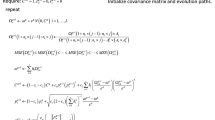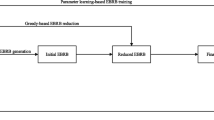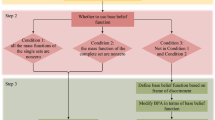Abstract
A belief rule-based inference approach and its corresponding optimization algorithm deal with a rule-base with a belief structure called a belief rule base (BRB) that forms a basis in the inference mechanism. In this paper, a new learning method is proposed based on the given sample data for optimally generating a consistent BRB. The focus is given on the consistency of BRB knowing that the consistency conditions are often violated if the system is generated from real world data. The measurement of BRB inconsistency is incorporated in the objective function of the optimization algorithm. This process is formulated as a non-linear constraint optimization problem and solved using the optimization tool provided in MATLAB. A numerical example is demonstrated the effectiveness of the proposed algorithm.
Similar content being viewed by others
References
Appice A., D’Amato C., Esposito F., Malerba D.: Classification of symbolic objects: a lazy learning approach. Intell. Data Anal. 10, 301–324 (2006)
Coleman T., Branch M.A., Grace A.: Optimization Toolbox—for Use with Matlab. The Mathworks Inc., Natick, MA (1999)
Dempster A.P.: A generalization of Bayesian inference. J. Royal Stat. Soc. Ser. B 30, 205–247 (1968)
Hefny H.A.: Comments on “Distinguishability quantification of fuzzy sets”. Inf. Sci. 177, 4832–4839 (2007)
Jin Y.C., von Seelen W., Sendhoff B.: On generating FC 3 fuzzy rule systems from data using evolution strategies. IEEE Trans. Syst. Man Cybern. Part B: Cybern. 29(6), 829–845 (1999)
Liu J., Yang J.B., Wang J., Sii H.S., Wang Y.M.: Fuzzy rule-based evidential reasoning approach for safety analysis. Int. J. Gen. Syst. 33(2–3), 183–204 (2004)
Liu J., Yang J.B., Ruan D., Martinez L., Wang J.: Self-tuning of fuzzy belief rule bases for engineering system safety analysis. Ann. Oper. Res. 163(1), 143–168 (2008)
Pardalos M., Hansen P.: Data Mining and Mathematical Programming, CRM, vol. 45. American Mathematical Society, Providence, RI (2008)
Shafer G.: A Mathematical Theory of Evidence. Princeton University Press, Princeton, NJ (1976)
Triantaphyllou, E.: Data Mining and Knowledge Discovery via Logic-Based Methods Theory, Algorithms, and Applications, Series: Springer Optimization and Its Applications, vol. 43 (2010)
Triantaphyllou E., Mann S.H., Pardalos P.M.: A minimization approach to membership evaluation in fuzzy sets and error analysis. J. Optim. Theor. Appl. 66, 275–287 (1990)
Triantaphyllou E., Lootsma F., Mann S.H., Pardalos P.M.: On the evaluation and application of different scales for quantifying pairwise comparisons in fuzzy sets. J. Multi-Criteria Decis. Anal. 3, 133–155 (1994)
Xu D.L., Yang J.B., Liu J., Liu G.P., Wang J., Jenkinson I., Ren J.: Inference and learning methodology of belief-rule-based expert system for pipeline leak detection. Expert Syst. Appl. 32(1), 103–113 (2007)
Yang J.B.: Rule and utility based evidential reasoning approach for multi-attribute decision analysis under uncertainties. Eur. J. Oper. Res. 131, 31–61 (2001)
Yang J.B., Liu J., Wang J., Sii H.S.: A generic rule-base inference methodology using the evidential reasoning approach—RIMER. IEEE Trans. Syst. Man Cybern. 36(2), 266–285 (2006)
Yang J.B., Xu D.L.: On the evidential reasoning algorithm for multiple attribute decision analysis under uncertainty. IEEE Trans. Syst. Man Cybern.-Part A 32(3), 289–304 (2002)
Yang J.B., Xu D.L.: Nonlinear information aggregation via evidential reasoning in multi-attribute decision analysis under uncertainty. IEEE Trans. Syst. Man Cybern.—Part A: Syst. Hum. 32(3), 376–393 (2002)
Yang J.B., Liu J., Xu D.L., Wang J., Wang H.W.: Optimization models for training belief rule based systems. IEEE Trans. Syst. Man Cybern. Part A: Syst. Hum. 37(4), 569–585 (2007)
Zadeh L.A.: Fuzzy sets. Inf. control 8, 338–353 (1965)
Zimmerman H.J.: Fuzzy Set Theory and Its Application. Kluwer, Norwell, MA (1991)
Author information
Authors and Affiliations
Corresponding author
Rights and permissions
About this article
Cite this article
Liu, J., Martinez, L., Ruan, D. et al. Optimization algorithm for learning consistent belief rule-base from examples. J Glob Optim 51, 255–270 (2011). https://doi.org/10.1007/s10898-010-9605-x
Received:
Accepted:
Published:
Issue Date:
DOI: https://doi.org/10.1007/s10898-010-9605-x




